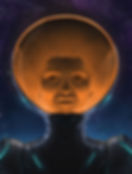What is Afrofuturism?
- lctosaya
- Mar 21, 2018
- 4 min read
Early Afrofuturism:
Within the scope of Science Fiction, there is a subgenre that focuses on the creation of Utopias and Dystopias for African Americans that is known as Afrofuturism. Afrofuturism is the created science fictional future for African Americans, mainly written by African American authors. Since the early Twentieth Century Science Fiction has been primarily written by those who sought to keep African Americans in the background, oppressed, residing within a Dystopia, or simply nonexistent. The exclusion of African Americans as well as any person of color from any form of a science fictional future was and continues to be an obvious trend. These fictional future societies are usually misleading, leaving the audience to acknowledge how these societies are actual critical Dystopias under the guise of being a Utopia. Fortunately, there are those who have acknowledged these fictions and have decided to write a different type of Science Fiction that would be inclusionary and without prejudice as opposed to exclusionary. Afrofuturism has been around for quite some time, but it wasn’t until the mid-1990s that it was given a name. The term Afrofuturism was coined in 1993 by cultural critic Mark Dery to refer to “speculative fiction that treats African-American themes and addresses African-American concerns in the context of twentieth-century technoculture” (Dery 736). Since the mid-1990s Afrofuturism has expanded beyond the United States to many other countries that have African descendants are making their mark. Many authors, artists, filmmakers and even musicians in the past have created various works that could have been considered as Afrofuturist, but their works were labeled as something other than Science Fiction. This was due to the lack of a definition in regards to their creations. 2 Although this sub-genre of Science Fiction has now been defined, it has yet to make as big of an impact as Euro-American Science Fiction to date.
Image: Space Fro - Roy Steuer
The Afrofuturist sub-genre of Science Fiction has been dated back to 1859, when it was previously called Black Science Fiction or even Black Speculative Fiction. These terms were later enveloped by what is known as Afrofuturism and are now one in the same. Lisa Yaszek writes that the term Afrofuturism became the umbrella term used to define how authors have aggressively examined and critiqued American institutions and practices that erase black people and their history from the future imaginary. In her article, "Afrofuturism, Science Fiction, and the History of the Future," Yaszek defines Afrofuturism as “a larger aesthetic mode that encompasses a diverse range of artists working in different genres and media who are united by their shared interest in projecting black futures derived from Afrodiasporic experiences” (52). In the article, “The Languages of Afrofuturism” written by Adriano Elia, the author states that there are many differing perspectives on what the term “Afrofuturism” means, due to its multiple connotations. Elia refers to other research writers Alondra Nelson and Kodwo Eshun, who claim that Afrofuturism’s main issues, are “sci-fi imagery, futurist themes, and technological innovation in the African diaspora” dealt with in “original narratives of identity, technology, and the future” (Nelson 9). However, Eshun argues that “Afrofuturism’s first priority is to recognize that Africa increasingly exists as the object of futurist projection” (Yaszek 48). Furthermore, Eshun challenges the idea of Africa as a metaphor for dystopia and catastrophe, suggesting instead an optimistic – or at least an unbiased – vision of the future of Africa. To this purpose, Afrofuturism is “a program for recovering the histories of counter-futures created in a century hostile to Afro-diasporic projection” (Eshun 301).
Afrofuturism represents the changing relations of science as it pertained to African American history and future histories. Before Afrofuturism was coined, there were many definitions to be created, rewritten and interpreted: Yaszek notes in another article, “An Afrofuturist Reading of Ralph Ellison's Invisible Man”, that, “as a popular aesthetic movement centered on seemingly fantastic tropes such as ‘the encounter with the alien other’ and ‘travel through time and space,’ Afrofuturism holds the potential to bring the Afrodiasporic experience to life in new ways. As Alondra Nelson puts it, the science fictional elements of Afrofuturism provide both ‘apt metaphors for black life and history’ and inspiration for ‘technical and creative innovations’ of artists working in a variety of traditional and new media” (Yaszek 299-300). In a way, the “alien other” is representative of the African American people, since most were in a sense abducted by the European and Euro-American colonizers and brought to a land that was not within their own geographical familiarity. These now slaves to the foreign land, were forced to adhere to many customs and ways of life that were in fact alien to them. Stripped of their links to their ancestral cultures, forced into shackles and forbidden to fully assimilate with American cultures, African Americans, have experienced a liberation from the dead hand of history in a way unmatched in history (Patterson 61). So in actuality African Americans became aliens within an alien world that was ruled by Euro-American masters, with no chance of becoming equals.



























